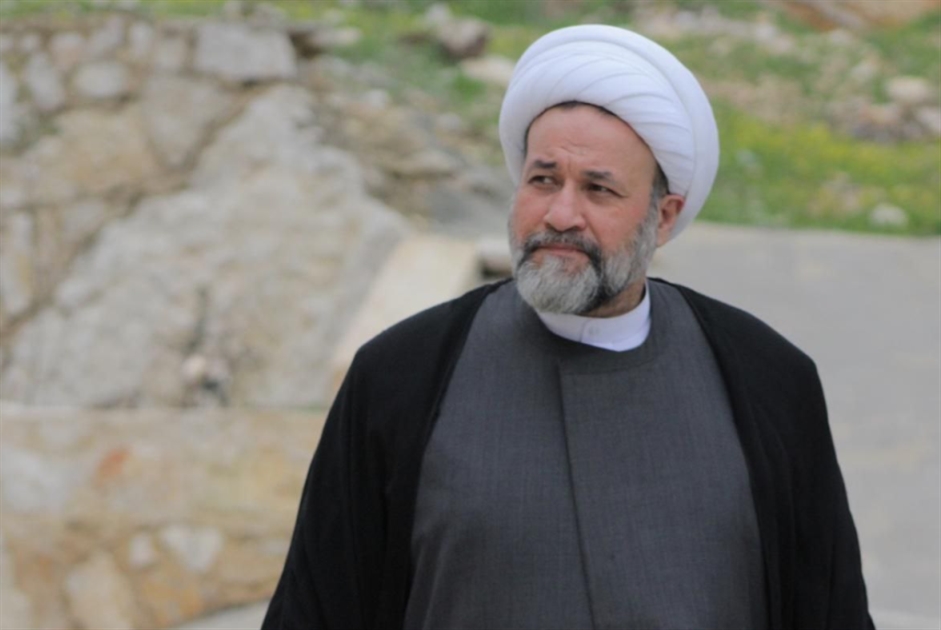Al-Manar English Website’s Areej Fatima El Husseini translated an article written by Fuad Bazzi on a prominent Hezbollah preacher Sheikh Akram Barakat. The Wednesday’s (February 8) article was published by Lebanese newspaper Al-Akhbar as Sheikh Barakat has been experiencing an illness.
Since last week, social media platforms have been buzzing with news of Sheikh Akram Barakat’s ailment, as followers have remarkably interacted with the situation, adjusting the heartbeats of people on the Sheikh’s heart. The eagerness of supplication, devotion, and longing for his recovery implies that the ill person is a beloved member of every family. So, who is this man?
Several days were spent trying to figure out how Sheikh Akram Barakat was doing. His devotees are keeping track of his health condition on social media platforms as they share his images with news of his ailment, expressing their sympathy, and praying for him to be well. As if Sheikh Akram was present in every home, the man’s devotees sent a flow of spontaneous messages expressing their exceptional bond with him. They also asked people to recite certain Quranic verses, make supplications, and pray for his wellbeing.
After a period of anxiety, his family sought to calm all of his devotees by a letter declaring that “the sheik is pursuing a protracted treatment, which will end successfully, God willing”, calling on everyone to be patient and pray, especially after hearing misleading rumors about his condition.
University Professor, Educator
Sheikh Akram Barakat is an instructor at the Islamic seminary, a university professor, and above all, an educator. After his ailment, he had asked no one to disseminate the news of his condition, and neither gave any authorization before penning these lines. These “approvals” are not required for the feelings of admiration and connection that are sown deep in the hearts of his devotees and admirers.
We, his devotees, are fully aware that he is the furthest away from the limelight and that the world of fame has never enticed him, even though he is the most renowned figure in the arena of religious preaching, and has unique expertise in addressing people smoothly and eloquently. Also, he is a loving person who shows physical affection, a person with leniency in discussions and a pleasant countenance, who never scowled in the face of the most challenging questions, even those dubious of religion.
First Imam of Al Qaem Mosque, Beirut
In return to the admirers and devotees, other people are watching what is going on, wondering and attempting to figure out, “Who is Sheikh Akram Barakat?” And why do people pray for him to recover? How did they get to know him?”. For the admirers, the answer is simple, as he lives in their hearts. First, Sheikh Akram is the Imam of Sfeir’s Al Qaem Mosque in Beirut’s southern suburb (Dahiyeh). People in the region have always been proud to be Sheikh Akram’s neighbors and attendees of Hezbollah’s first mosque in Lebanon. Sayyed Hassan Nasrallah, Secretary General of Hezbollah, personally inaugurated Al Qaem Mosque in 1998. Therefore, as a result of Sheikh Akram’s effectiveness in overseeing the mosque, the construction of mosque complexes extended throughout the other regions.
In terms of his daily interactions with people, each individual who comes in contact with the sheikh has a story to tell, especially if he met him in the place where he passionately fell in love with. Hundreds of issues were resolved by his presence before his words behind the mosque’s mihrab and in an office allocated to receive visitors. One day, a couple who decided to divorce came into his office, saying they couldn’t live together any longer. Sheikh Akram asked each of them to list his partner’s positive traits. After doing so, they fell in love with each other all over again and thanked the Sheikh for saving their marriage. In another incident, he advised a man whose brother had seized his money to “forgive when possible and to acquire his brother’s love rather than gaining and demanding great sums of money”.
Although the sheik physically left the mosque in recent years, after being engaged in other activities, we can still sense his spiritual presence. How could he not, after establishing and supervising it for years and raising funds from all over the world? The smoothness of the sheik’s religious speech, as well as the simplicity of associated concerns, encouraged his admirers to keep track of his activities and approach him from all around. Thousands crammed into the mosque, sitting on the floors and stairs, all the way to the rooftops, to commemorate holy occasions on the nights of Ashura or the month of Ramadan. They used to listen carefully to Sheikh Akram’s sermons and directives. Silence falls whenever he ascended the pulpit since he addressed the people in simple language, relieving their worries, and offering religion as the simple solution after demonstrating it sensibly. His words have always soothed their hearts.
“Contrary to the custom in mosques, Sheikh Akram used to bring youngsters to the front rows during prayers”
Sheikh Akram spent a quarter-century in Al-Qaem Mosque, where he proved remarkable leadership capabilities. He used to offer time to the children in the mosque, contrary to the usual in most mosques, allowing worshipers to bring their children with them while remaining calm throughout the lectures. These children grew up to be youngsters who pray in the front rows, and seminars are held with them almost every day. He used to check the attendance regularly and inquire about those who are absent so he may check on them later. Moreover, Sheikh Akram used to instruct and guide, and talk with sincerity and paternal sentiments that have an indelible mark on the youth who have transitioned from one state to another during the last 25 years. These lectures have made martyrs and resistance leaders, as well as active youth in various domains, including today’s doctors, engineers, university professors, and great parents, all of whom say, “Our father, Sheikh Akram”, while he used to speak proudly about his youth saying, “These are my sons”.
A Lecturer at University Halls
The Sheikh’s interaction with university students was comparable to that with youngsters at the mosque. We could never forget the scene in the Faculty of Arts – Fifth Branch halls, which were crowded with students not to attend the course, but to attend his lectures. His presence extends to the academic arena among the youth, as he continuously tours the various faculties to hear about and discuss the concerns of the youth. It is enough to include his name in the invitation text to fill the hall hours before his arrival. Afterward, passionate students’ hearts hold him for extra hours between the faculty’s hallways.
During one of the lectures at AUB, the audience moved between many halls since the questions could not halt and the halls were allocated for academic courses. He consults with students, instills confidence in them, and encourages them to take the initiative, rectifying mistakes with unrivaled kindness. Sheikh Akram did not conventionally impart knowledge but rather simplified or complicated it depending on the addressee in front of him. He was a profound professor in the Islamic seminary’s advanced research circles and a scholar of religious sciences. Similarly, Sheikh Akram curated education and students at the university, turning them into intellectuals, instilling confidence in them, pushing them towards scientific research and contemplating, and addressing them in a comprehendible language. Despite the clamor of mosque attendees, he was keen about “the comfort of the mosque’s neighbors. According to his advice, the mosque’s loudspeakers were not turned up outside except during the call to prayer.
An Admired Islamic Seminary Professor
Sheikh Akram Barakat started teaching seminary at an early age. He was only 17 years old when he taught the first course at the Rasoul Akram Seminary, in 1985, and this has continued unabated since then. “It made the seminary scholars demand to acquire from him,” people who know him remark. However, this just enhanced his modesty and connection to the students and the public at large. Despite the assurance of most of those close to him, he never claimed to be diligent. In addition, the Sheikh has an undeniable intellectual presence. However, he dropped all prior titles like Doctor, Sheikh, and Eminence, and simply signed his publications, “Akram Barakat.”
“He was persistent until his last breath” in the last period before the ailment. He was devoted to his work as usual, with unrivaled insight. On top of that, Sheikh Akram was keen to document and archive his experience and provide it for free on his web pages. He had no desire for power or fame, rather, he flipped the entire prior page, not even expressing regret for what had gone. Instead, he moved on to other concerns after he thought he had fulfilled all of his duties.
Finally, my teacher, we are impatiently awaiting your return in good health, as we are currently grieving a great loss. We aspire to learn more from you. We further pray to God with the supplication that you used to recite at the end of every prayer you led in Al Qaem Mosque: “O compassionate Allah, have mercy on your feeble servant. O our God, who holds concealed kindness, save us from what we warn and fear,” and we fear losing you, my dear educator.
Source: Al-Akhbar newspaper (translated by Al-Manar English Website)




